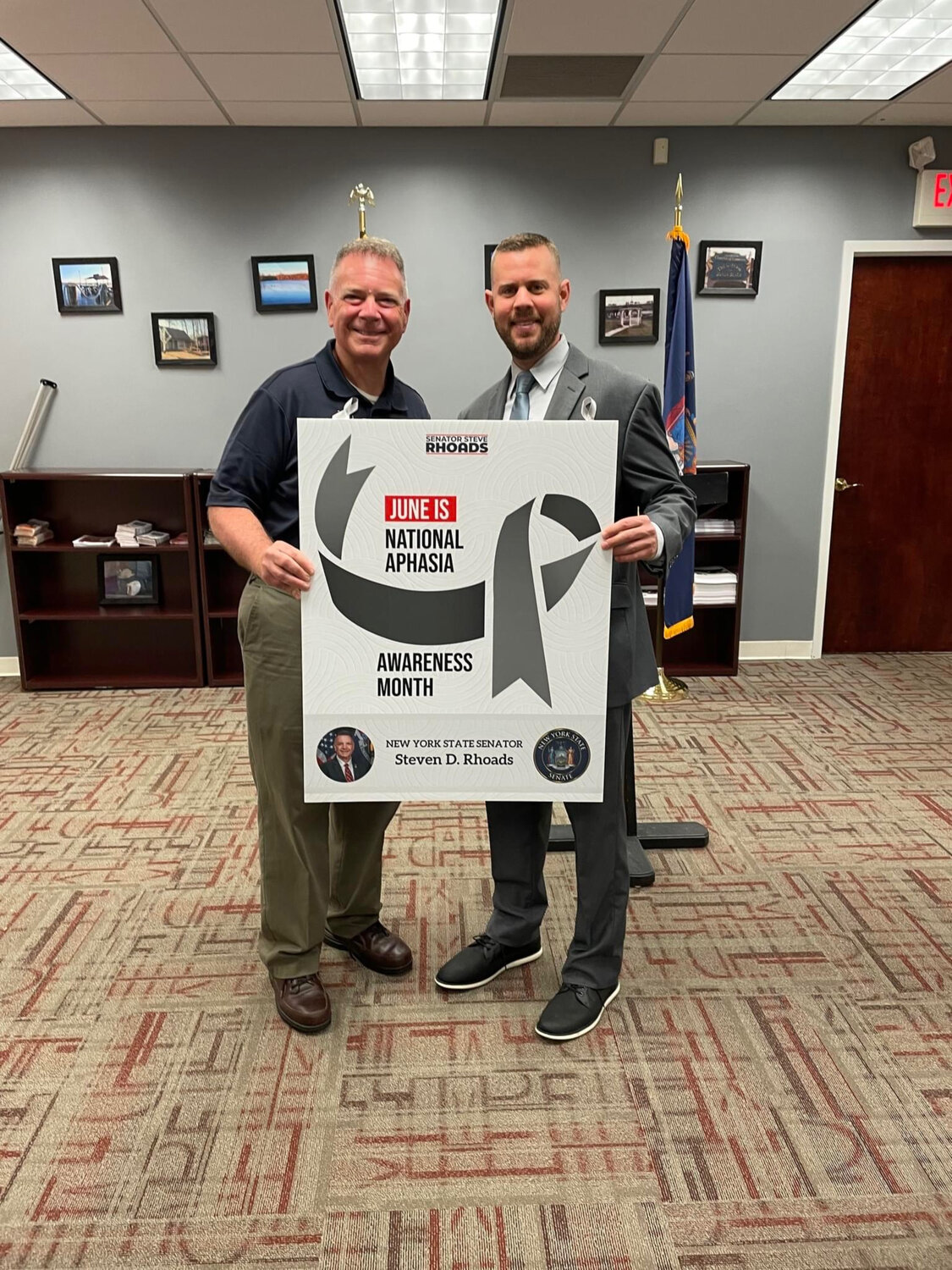Matthew Weingartner shares his experience of handling aphasia to spread awareness with help from Senator Steve Rhoads
April 18, 2018, started out as a normal day for Salisbury resident Matthew Weingartner. The then 30-year-old was studying to be an electrician for Local Union 3. One minute he was in class, and the next minute he woke up in a hospital bed.
“Everything went black,” Weingartner recalled. “The paramedics rushed me to Weill Cornell in the city.”
It turned out that Weingartner had suffered a massive ischemic stroke from a blood infection that traveled to a valve of his heart, causing a clot to break loose and make its way to his brain. It left him partially paralyzed and unable to speak without difficulty.
From the stroke, he developed aphasia, a disorder caused by damage to the portion of the brain responsible for language. The disorder impairs the expression and understanding of language as well as reading and writing.
“In the hospital, I just felt confusion,” Weingartner said. “For maybe a month or two after, too, I don’t know, I was just focusing on getting better.”
Now, 35, Weingartner continues weekly physical therapy, occupational therapy and speech therapy and has made great strides in his recovery. He stays positive, and works hard in his rehabilitation so he can return to full functioning.
After working so hard for years, he knew he wanted to do something to show others what aphasia is, and let others with the disorder know that they’re not alone.
In June, after meeting State Sen. Steve Rhoads through a mutual friend, Weingartner and Rhoads teamed up to increase aphasia awareness.
On June 4, Rhoads, Weingartner, friends, family, plus students and doctors from Hofstra University and LIU Post’s aphasia programs, announced that June is now officially Aphasia Awareness Month in New York state with the unanimous passage of Rhoads’s Senate resolution J696. The county, in solidarity, lit the legislative building in Mineola gray for the month.
The crew also put together an Aphasia Awareness Open House at the LIU Post Ladge Speech and Hearing Center on June 28. Weingartner gets treatment at the center, and they thought it would be a great way to inform more people about what the disorder is like.
“Aphasia is a loss of language, but not a loss of intellect,” Rhoads said in a statement. “The fact that there are 2 million individuals, many of whom are suffering in silence because they are unaware of the resources available for help, presented a tremendous opportunity to do so much good.”
Open house attendees heard patient’s stories about their triumphs over aphasia and saw the work done by the medical staff, program supervisors, and graduate students at LIU Post. It also provided a unique opportunity to observe an aphasia support group in action as well as see interactive therapy sessions like boxing and “name that tune” that help aphasia patients redevelop their speech, motor, and social skills.
“It was an awesome experience,” Weingartner said. “It was a great opportunity. Lots of my friends came too and lots of people I don’t know.”
Weingartner said it was always his nature to stay positive. Recovering from the stroke was frustrating, but he knew he had to keep going.
In June of 2020, he started a YouTube channel called “A Matter of Matt” with help from his brother, Michael. The channel tells his story, his struggles, and his progress. There are 18 episodes, and the last one aired in April, marking five years since his stroke.
Before the stroke, Weingartner was an athlete on track to play baseball at Farmingdale State College. That was interrupted when he failed an EKG exam during his school’s mandated sports physical. He saw a cardiologist to clear him to play, but instead was told that the echocardiogram found a malfunctioning tricuspid valve that was also causing an enlarged aorta.
He was diagnosed with an ascending aortic aneurysm and in December of that year underwent emergency open heart surgery to replace the malfunctioning valve and have a surgical graft placed on his aorta. He went back to school and played baseball, and graduated in 2010.
In December of 2017, he had his second open heart surgery to replace the malfunctioning valve from 2006. He was on the road to recovery when he had the stroke.
Weingartner took it as an opportunity to get involved and spread the word of positivity through organizations like Voices of Hope For Aphasia, Aortic Hope, and Aphasia Recovery Connection. He was a New York leader for the annual 5K walk for Aortic Warriors, a nonprofit that supports survivors of aortic dissection and aortic ruptures. He had his own chapter in the book “Finding Yourself After Stroke,” by Letisha Living where he talks about his experiences.
He hopes to continue raising awareness and bring back the open house annually. He had ideas of hosting an event in Eisenhower Park to raise money for different aphasia organizations.
“It’s going to be a long journey, but hopefully I can speak out more and raise more awareness,” Weingartner said. “Maybe my life can be a legacy, so I’m going to keep trying different stuff, and different exercises and different techniques and not focusing on the negatives, but on the positive outcomes.”






